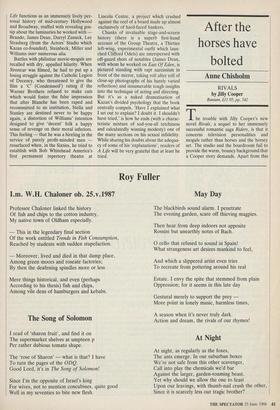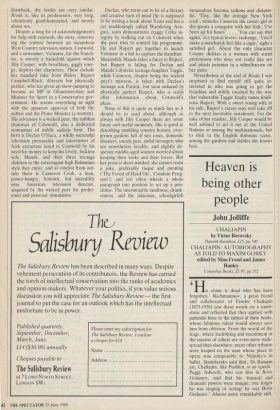After the horses have bolted
Anne Chisholm
RIVALS by Jilly Cooper
Bantam, £11.95, pp. 542
The trouble with Jilly Cooper's new novel Rivals, a sequel to her immensely successful romantic saga Riders, is that it concerns television personalities and moguls rather than horses and the horsey set. The studio and the boardroom fail to provide the warm, bouncy background that a Cooper story demands. Apart from this drawback, the books are very similar. Rivals is, like its predecessor, very long, relentlessly good-humoured, and mostly about sex.
Despite a long list of acknowledgements for help with research, the story, concern- ing the contest between an incumbent West Country television station, Costwold, and a newcomer, Venturer, for the franch- ise, is merely a backcloth against which Jilly Cooper, with breathless, giggly ener- gy, deploys her characters. These include her standard rake from Riders, Rupert Campbell-Black, illiterate but physically perfect, who has given up show-jumping to become an MP in Gloucestershire and Minister for Sport in a Conservative gov- ernment. He screws everything in sight with the apparent approval of both the author and the Prime Minister (a woman). His adversary is a wicked peer, the ruthless chairman of Cotswold, also a dedicated womaniser of mildly sadistic bent. The hero is Declan O'Hara, a wildly successful television personality and interviewer of Irish extraction lured to Cotswold by his need for money to keep his lovely, feckless wife, Maude, and their three teenage children in the extravagant high Bohemian style they enjoy; and as catalyst from out- side there is Cameron Cook, a lean, power-hungry, feminist, but incredibly sexy American television director, acquired by the wicked peer for profes- ional and personal stimulation.
Declan, who turns out to be of a literary and creative turn of mind (he is supposed to be writing a book about Yeats and has a cat maddeningly called Wandering Aen- gus), soon demonstrates craggy Celtic in- tegrity by walking out on Cotswold when the peer tries to control his programme. He and Rupert get together to launch Venturer in a bid to capture the franchise. Meanwhile Maude takes a fancy to Rupert, but Rupert is falling for Declan and Maude's dyslexic teenage daughter Taggie, while Cameron, despite being the wicked peer's mistress, is taken with Declan's teenage son Patrick, but soon seduced by physically perfect Rupert, who is really after information about Cotswold's plans.
None of this is quite as much fun as it should be to read about, although as always with Jilly Cooper there are some funny and rueful moments. She is good at describing rambling country houses, over- grown gardens full of wet roses, domestic disasters, unruly pets, awful teenagers who are nonetheless lovable, and slightly de- sperate middle-aged women worried about keeping their looks and their lovers. But her prose is short-winded; she cannot resist a joke, preferably risque and punning ('The Forest of Hard On', 'Condom Perig- non'); and too often wheels a whole paragraph into position to set up a pun- chline. The interminable randiness, drunk- enness, and the salacious, schoolgirlish innuendoes become tedious and distaste- ful. 'Tiny, like the average New York cock', remarks Cameron the career girl as she spears a courgette with her fork. 'I've been up for hours' . . . 'You can say that again,' is a typical lovers' exchange. 'You'd make a matchstick feel like a cigar,' sighs a satisfied girl. About the only character Cooper dislikes is a woman with social pretensions who does not really like sex and plants petunias in a wheelbarrow on her patio.
Nevertheless at the end of Rivals I was surprised to find myself still quite in- terested in who was going to get the franchise and mildly touched by the way that vulnerable Taggie finally tames libidi- nous Rupert. With a sweet young wife at his side, Rupert's career may well take off in the next inevitable instalment. For the sake of her readers, Jilly Cooper would be well advised to set it not at the United Nations or among the multinationals, but to stick to the English domestic scene, among the gardens and stables she knows best.











































































 Previous page
Previous page